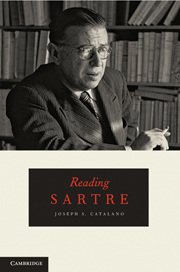Book contents
- Frontmatter
- Contents
- Preface
- Acknowledgments
- Works Frequently Cited
- PART ONE A RETROSPECTIVE OVERVIEW
- 2 Saint Genet: Actor and Martyr
- 3 The Critique of Dialectical Reason
- 4 Being and Nothingness
- PART TWO THE WORKS THEMSELVES
- 5 Being and Nothingness
- 6 The Critique of Dialectical Reason
- 7 Saint Genet: Actor and Martyr
- 8 The Family Idiot
- 9 The Family Idiot
- Afterword: Madame Bovary
- Index
- References
5 - Being and Nothingness
Published online by Cambridge University Press: 05 June 2012
- Frontmatter
- Contents
- Preface
- Acknowledgments
- Works Frequently Cited
- PART ONE A RETROSPECTIVE OVERVIEW
- 2 Saint Genet: Actor and Martyr
- 3 The Critique of Dialectical Reason
- 4 Being and Nothingness
- PART TWO THE WORKS THEMSELVES
- 5 Being and Nothingness
- 6 The Critique of Dialectical Reason
- 7 Saint Genet: Actor and Martyr
- 8 The Family Idiot
- 9 The Family Idiot
- Afterword: Madame Bovary
- Index
- References
Summary
This second part concerns a more formal and somewhat more chronological reflection on the four works examined previously, and thus we begin here to redo the last chapter of the first part, namely, a study of Being and Nothingness. This work can be effectively viewed as a reply to Martin Heidegger's own first book Being and Time; but if one is not familiar with Heidegger, this is hardly a useful observation. Perhaps, then, it is best to simply note that the book was published in French by Gallimard in 1943, and that it was successfully translated by Hazel Barnes in 1956. Sartre's association with Gallimard began with the publication of his earlier novel La Nausée – Nausea – in 1938, and for the most part, Gallimard remained Sartre's publisher throughout Sartre's life, putting into print both his literary and his philosophical works. The major exceptions are three of the four monographs that preceded Being and Nothingness. The first, published in 1936, concerned the imagination; the second, published in a journal dated 1936–1937, concerned the ego, and the third, published in 1939, made the point that the emotions should be considered a free choice. The fourth, which Gallimard did publish in 1940, returned to the imagination, indicating Sartre's continual fascination with the subject. Sartre would remain faithful to his early notion that an image is not a mere inner picture of a thing, but the thing itself as absent.
- Type
- Chapter
- Information
- Reading Sartre , pp. 91 - 112Publisher: Cambridge University PressPrint publication year: 2010



